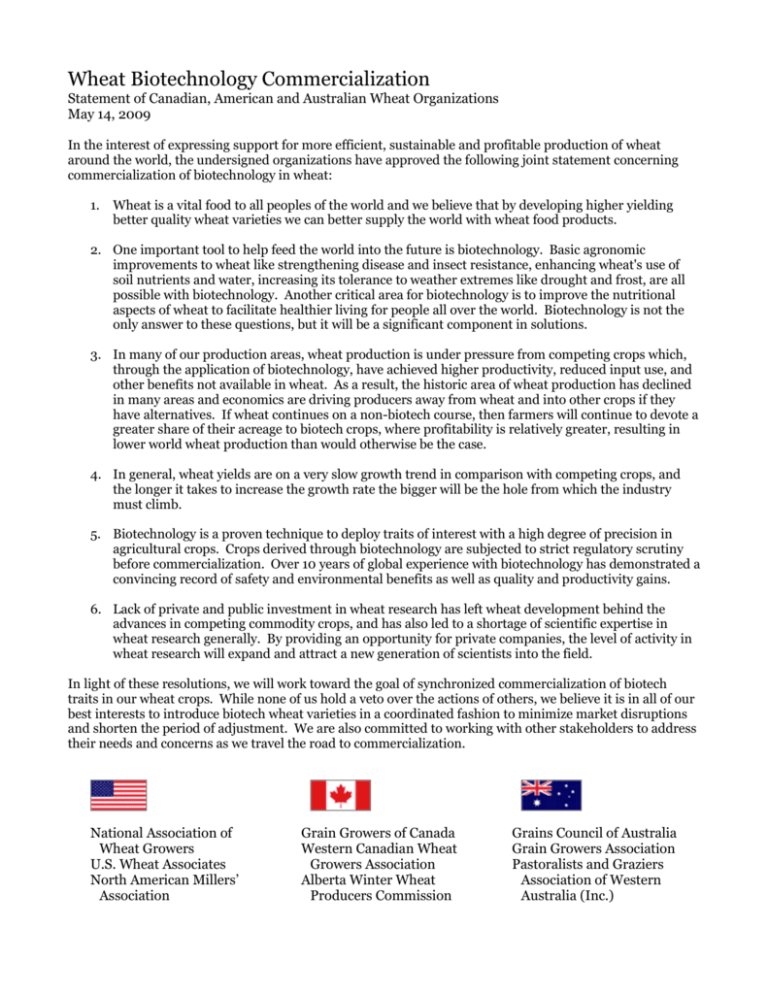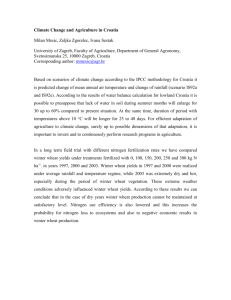Trilateral Biotech Statement - May 14, 2009
advertisement

Wheat Biotechnology Commercialization Statement of Canadian, American and Australian Wheat Organizations May 14, 2009 In the interest of expressing support for more efficient, sustainable and profitable production of wheat around the world, the undersigned organizations have approved the following joint statement concerning commercialization of biotechnology in wheat: 1. Wheat is a vital food to all peoples of the world and we believe that by developing higher yielding better quality wheat varieties we can better supply the world with wheat food products. 2. One important tool to help feed the world into the future is biotechnology. Basic agronomic improvements to wheat like strengthening disease and insect resistance, enhancing wheat's use of soil nutrients and water, increasing its tolerance to weather extremes like drought and frost, are all possible with biotechnology. Another critical area for biotechnology is to improve the nutritional aspects of wheat to facilitate healthier living for people all over the world. Biotechnology is not the only answer to these questions, but it will be a significant component in solutions. 3. In many of our production areas, wheat production is under pressure from competing crops which, through the application of biotechnology, have achieved higher productivity, reduced input use, and other benefits not available in wheat. As a result, the historic area of wheat production has declined in many areas and economics are driving producers away from wheat and into other crops if they have alternatives. If wheat continues on a non-biotech course, then farmers will continue to devote a greater share of their acreage to biotech crops, where profitability is relatively greater, resulting in lower world wheat production than would otherwise be the case. 4. In general, wheat yields are on a very slow growth trend in comparison with competing crops, and the longer it takes to increase the growth rate the bigger will be the hole from which the industry must climb. 5. Biotechnology is a proven technique to deploy traits of interest with a high degree of precision in agricultural crops. Crops derived through biotechnology are subjected to strict regulatory scrutiny before commercialization. Over 10 years of global experience with biotechnology has demonstrated a convincing record of safety and environmental benefits as well as quality and productivity gains. 6. Lack of private and public investment in wheat research has left wheat development behind the advances in competing commodity crops, and has also led to a shortage of scientific expertise in wheat research generally. By providing an opportunity for private companies, the level of activity in wheat research will expand and attract a new generation of scientists into the field. In light of these resolutions, we will work toward the goal of synchronized commercialization of biotech traits in our wheat crops. While none of us hold a veto over the actions of others, we believe it is in all of our best interests to introduce biotech wheat varieties in a coordinated fashion to minimize market disruptions and shorten the period of adjustment. We are also committed to working with other stakeholders to address their needs and concerns as we travel the road to commercialization. National Association of Wheat Growers U.S. Wheat Associates North American Millers’ Association Grain Growers of Canada Western Canadian Wheat Growers Association Alberta Winter Wheat Producers Commission Grains Council of Australia Grain Growers Association Pastoralists and Graziers Association of Western Australia (Inc.)




